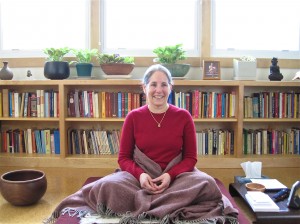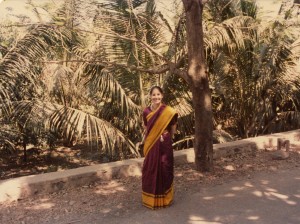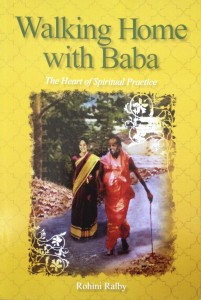1. How did you start pursuing spiritual practice?
 I’ve always pursued spiritual practice; it’s just that my practice, and my understanding of practice, have evolved. As a little girl, my focus wasn’t on religious ritual but on the experience of being with and understanding God. Through dance, through Tai Chi Chuan, and finally through Muktananda, I came to understand what that truly means. I’ve always looked for the bottom line of existence.
I’ve always pursued spiritual practice; it’s just that my practice, and my understanding of practice, have evolved. As a little girl, my focus wasn’t on religious ritual but on the experience of being with and understanding God. Through dance, through Tai Chi Chuan, and finally through Muktananda, I came to understand what that truly means. I’ve always looked for the bottom line of existence.
2. How did your formal education factor into your spiritual development?
I’ve always been interested in finding good teachers. For me, discipline and structure have been very important. Throughout my formal education, I sought out the best teachers I could in whatever field I was studying. One chapter in my book relates stories about some of my early teachers.
3. Many people say that contemporary American culture is spiritually bankrupt or even toxic. Would you agree, and, if so, how would you suggest people sustain and develop their spiritual lives in that environment?
Yes, I agree—contemporary culture is largely hostile to real spiritual practice. We have worked to make God and spiritual practice acceptable to our lower selves. In our consciousness, God, the limitless, has been limited into narrow ideas, which are delusional. Our limited understanding tries to make the ungraspable graspable. In the process, we lose God, and instead worship our own projections. In order to get on track and sustain an authentic spiritual life, you have to do what I did: seek out a good teacher or spiritual director, whatever faith tradition you inhabit. As a society, we used to value the apprenticeship model, where the master passes on a tradition of practice, as well as knowledge, to students, who gradually gain mastery themselves. We don’t seem to cherish this approach to acquiring knowledge and expertise anymore. We tend to disregard or disrespect the very notion of expert authority, especially in matters of the spirit.
4. What inspired you to write this book after so many years of practicing privately and declining to advertise?
As much as I mistrust the word, it was a “calling.” Spiritual practice means, among other things, being able to hear and trust your true innermost voice. I prefer to avoid the limelight, but I felt an imperative to write this book and send what I have learned, and what I teach, out into the world.
5. How can readers apply the teachings in Walking Home with Baba to their daily lives?
The most obvious answer is to read the book, which explains exactly how to do this. Spiritual practice isn’t something you do in a laboratory and then leave. You may start practicing in a quiet space, but your practice can’t mature until you’ve integrated it into your daily living. No matter where you are or what you’re doing, you can practice inwardly. And ultimately, spiritual practice is purely internal, and no one even needs to see you doing it, even in public.
6. Do readers have to give up their religious convictions or subscribe to Indian beliefs in order to practice what you teach in the book?
Absolutely not. Spiritual practice is universal; it isn’t specific to one creed. If you go to the heart of any real spiritual tradition, you will find the same practice.
7. What’s one example of a tool you’ve developed for spiritual practice?
Many of my students have found the Foursquare Personality Game to be a powerful tool for recognizing where they are attached, how those attachments distort their view of themselves and others, and how to free themselves. In the chapter of Walking Home with Baba that presents the Foursquare Personality Game, I explain how it works and offer some examples. The point is that our lower self will always label itself based on positive and negative dichotomies, and in most cases we won’t call the resulting qualities what they actually are. For example, I may think of myself as “spontaneous” when I’m actually impulsive and irresponsible, and the reason I refuse to be measured in my behavior is that I “know” that would be rigid and boring. In order to get clear of one side of that dichotomy of “spontaneous” and “uptight,” I have to accept that I have all four qualities (including “impulsive” and “measured”) and be completely okay with them. This is not an intellectual exercise—it has to be done in the moment, in total honesty.
8. How do the anecdotes about your experiences with Baba relate to the rest of the book?
 Those stories show how I learned through actual events, and how we all can learn from the activities of our own lives. In most cases, I don’t attach an explicit lesson or moral to the stories. Readers will need to reflect on them.
Those stories show how I learned through actual events, and how we all can learn from the activities of our own lives. In most cases, I don’t attach an explicit lesson or moral to the stories. Readers will need to reflect on them.
9. How do you see yourself fitting into the lineage of Muktananda and Nityananda?
Baba always said that everyone who received Shaktipat from him was his successor. Of course, he meant those people who not only received Shaktipat but also consciously imbibed the practice. Baba is my Guru. He gave me Shaktipat and taught me the practice one-on-one, over many years.
10. You spoke at an international conference on human security the summer of 2012. How does spiritual practice relate to human security and conflict transformation?
Conflict transformation is only possible through inner transformation. Trying to transform a conflict from the outside in, by fixing the externals, doesn’t accomplish the real work of transforming people’s inner understanding of themselves, which is the real core of any conflict. There’s nothing naïve about this. On the contrary, there’s something very naïve about thinking that externally imposed structures will ever get to the root of a conflict.
11. You haven’t sought to affiliate yourself with any of the popularly known schools or networks of yoga practitioners and writers on spirituality. Why not?
I found my Guru, I found the path, and I’ve continually been doing my own work. There was no need for me to distract myself with extra affiliations.
My parenting is inseparable from my spiritual practice. Baba was my father and mother. He brought me up, and showed me what it means to be a good parent. My two sons have practiced from a very young age, and their practice has guided and sustained them through all their experiences, good, bad, and indifferent.
13. How do you enjoy yourself in your spare time in ways that are consistent with your spiritual practice?
To begin with, I’m constantly practicing. When I have free time, I enjoy hanging out with family, cooking, and eating, walking in my garden, and occasionally watching movies or television. I like watching sports, especially football. Spiritual practice doesn’t mean that you can’t enjoy life. Baba always spoke of bukti and mukti—enjoyment and liberation. They’re not mutually exclusive. The point is to be nonattached.
14. Several years ago, you had to face a diagnosis of breast cancer, and received extensive treatment. How did spiritual practice shape your response to cancer? How has that experience affected your spiritual practice and your work as a spiritual director?
As frightening and painful as that experience was, I approached it in the spirit Baba taught me: Whatever God does, He does for good. After each chemo treatment, I would go to my room for a week and dig in, boring into the Heart, and get under the experience of pain. I would rest there until I was able to get up and go about my life, still boring in beneath the pain. The entire experience affirmed the practice Baba taught me.
15. What difficulties did you have in articulating the subtle principles you present in Walking Home with Baba, and how did you overcome those difficulties?

I’ve been finding ways to articulate these things for years as a spiritual director, so translating all that into prose was not that difficult. Practice makes perfect.
Mind and body are objects. The spirit—the Self—is not. They are not equal. The mind and body are temporary vehicles, the agents of the Self. They are real in the sense that they exist, but they are not eternal. Any spiritual practice that focuses on the body is missing the mark. The Self enlivens the body and the mind, and the Self must be the focus of any authentic spiritual practice. For a fully realized, liberated being, everything is revealed to be God, including the physical universe, but for the rest of us, that’s just a nice idea, and a misleading one.
17. How does your teaching fit into the New Age movement?
It doesn’t. My teaching follows the centuries-old lineage that came to me through Muktananda. My teaching works out of that tradition, using scriptures such as the Shiva Sutras and the Vijnanabhairava, as well as the Yoga Sutras and such Western texts as the sermons of Meister Eckhart and the Philokalia.
18. To what extent does your teaching overlap with what might be called therapy?
There is some overlap, in that you have to know your lower self’s system, a lot of which is based on your childhood experiences.. You can’t transcend what you don’t understand. But that’s where the similarities end. In spiritual practice, problems are seen as life lessons that have to be mastered and transcended. Conventional psychology can identify many of your problems and help to acknowledge them, but it doesn’t show you how to transcend them, how to leave them behind. Spiritual practice does, because it’s grounded in a very different, deeper sense of the Self.
19. How much of your spiritual direction involves showing people how to recover their inner child?
None whatsoever. The idea of the inner child is one of the most unhealthy concepts I’ve ever come across. In reality, the inner child is a spoiled brat who feels entitled, misunderstood, unappreciated, and resentful. It is a thought-construct, and all of us need to let it go. This doesn’t mean letting go of innocence and spontaneity; our inner child is actually neither of those. Letting go of the inner child means growing up into a human being.
20. Your guru, Swami Muktananda, died thirty years ago. What has it meant for you to continue your practice, and to work as a spiritual director, for so long without your guru?
The truth is that I’ve never been without my Guru. First of all, Baba remains a living presence within and around me. Also, as Baba always said, the true Guru is the grace-bestowing power of God, which may act through a human being but is never just that person.
Share this Post
